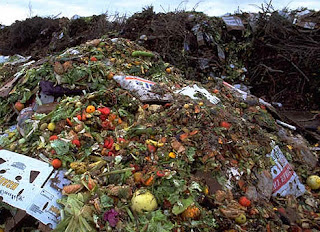Did
you know that food waste is the
largest component of solid waste in landfills? As much as 15 to 20
percent of the food supply in this country ends up in the household garbage
can.
Not a pretty sight: food waste in landfill
Our family began composting to give us a place to put to good "use" most of those kitchen scraps. My practical husband gets all the credit--he has been composting for many years, way before it was cool to do so!
Want some other practical reasons to compost?
According to experts, soil made from composting has many
advantages over the soil in your garden or yard that might be depleted of
nutrients. Other reasons to compost, courtesy of the
Texas Co-op Power e-newsletter:
- You’ll water less—a nice benefit in the midst of drought—because compost absorbs and retains moisture.
- You’ll use less fertilizer because compost is rich in nutrients.
- Compost improves the structure of heavy clay soils as well as loose sandy soils.
- It makes plants healthier and therefore more resistant to disease and pests, reducing the need for herbicides and pesticides.
- Less watering, fertilizing and treating saves money.
At our house, we keep things uber simple. There’s a
plethora of options for commercial kitchen “compost bins”—but we simply use a ceramic pot with a lid
that we line with plastic bags, the ones we use to bring home the produce (another simple recycling).
our compost pile
Again, your options for an official "composter" are many. Or you can do what we do. In a corner of our yard, somewhat contained by a chicken wire
divider, we dump daily our kitchen scraps and mix in freshly mowed
green grass and our raked dry leaves. That’s about
it.
A good rule of thumb is about one-third green and two-thirds
brown by volume. Green, nitrogen-rich items include grass clippings and food
scraps. Brown, high-carbon items include dry leaves, newspaper and
cardboard.
I know you’re supposed to “turn it,” but to be honest, we
mostly let our compost simply be. The result is still beautiful, rich soil that
I mix into my pots for growing herbs and that Michael breaks into the soil of
his vegetable garden.
Here’s more
information for those of you who want something a little more academic on composting, also here. Or if you prefer to go about it a little more “controlled,” also here.
However you do it,
may I suggest you give it a go?
+ + + + +
“In the beginning, God created the heaven and the earth."
~Genesis 1:1
Michael and Elenita mix compost into garden soil
"The Earth is indeed a precious gift of the Creator who, in
designing its intrinsic order, has given us bearings that guide us as stewards
of his creation. Precisely from within this framework, the Church considers
matters concerning the environment and its protection intimately linked to the
theme of integral human development.”
~Pope Benedict XVI,
General Audience, August 26,
2009
+ + + + +
“The world is not something indifferent, raw material to be utilized simply as we see fit. Rather, it is part of God’s good plan, in which all of us are called to be sons and daughters in the one Son of God, Jesus Christ (cf. Eph 1:4-12).”
~Pope Benedict XVI,
Apostolic Exhortation
Sacramentum Caritatis,
February 22, 2007




This post is a great reminder that keeping it simple, simply keeps the earth, not to mention the precious gift of one another, alive and well. Amen!
ReplyDeleteI'm all about keeping it simple, Fran--and my husband Michael tells me that his "style" of gardening & composting reminds him what it feels like to NOT have to do it perfect. I like that!
Delete